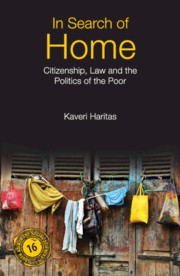6 - Conclusion
Published online by Cambridge University Press: 24 July 2021
Summary
Hakkugalu Saar Namma Hakkugalu
Hakkugalu Saar Namma Hakkugalu
Dudiva yella puttu makkaligu thiliya heluva hakku
Swatantradinda badukuva hakku
Shoshaneyinda rakshaneya hakku
Pratiyondu maguvigu shikshanada hakku
Bekaada maahithi thiliyuva hakku
Valleya aarogya padeyuva hakku
Valleya aahaara sevisuva hakku
Bekaada dharmadi baaluva hakku
Valleya bhaasheya aaduva hakku.…
Rights sir, our rights, rights that working children understand and speak of, right to live in freedom, right to be protected from exploitation, every child's right to education, right to information, right to good health, right to consume good food, right to choose one's religion, right to have a good language….
—Poem by Arul Das Vijay, ‘Bevarina Haadugalu’, 2013,Slum Janandolana, KarnatakaHakku literally means ‘right’ or something one claims as one's due from another. Because of my own bias, a training in law and an activist background, as well as the common translation of this word and its use by activists and NGOs to refer to human rights, I conflated hakku to mean human rights. I frequently came upon it in interviews, where it slipped out unexpectedly as a justification for acts such as the occupation of homes, the theft of electricity or water, the bribing of officials for allotments, and so on. I realised over time that there was a difference between how activists and NGO workers spoke of hakku and the way it was used by the residents of Laggere quarters. The poem in the epigraph, which is frequently used in protests, reflects these activist discourses of human rights that come to be dispersed on the field, amongst the urban poor, through the work these organisations do. The notion of hakku that people spoke of on the field was, however, more complex than these discourses of human rights, though not insulated from these notions. In a sphere where rights talk is omnipresent, and not just in the work of NGOs and other rights-based organisations, it is impossible for a notion of rights or claims to be insulated from these ideas.
However the claim for ‘rights’ or hakku where the law refuses to recognise these rights points to what Arendt (1951) calls the ‘right to have rights’. As Butler (2009) notes, rights are claimed drawing from the dominant language of law, of rights, even when there are no concrete rights that can be enforced.
- Type
- Chapter
- Information
- In Search of HomeCitizenship, Law and the Politics of the Poor, pp. 175 - 186Publisher: Cambridge University PressPrint publication year: 2021

